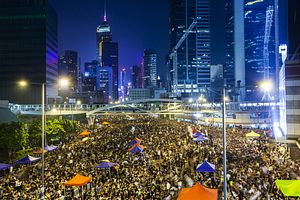Since the Occupy Central movement in Hong Kong re-intensified on September 27 when 50 students managed to reenter the barricaded Civic Square, Japan has been relatively silent on the issue – until last Friday. While the rest of the world has watched the tense situation unfold, Hong Kong’s third-largest trading partner has been reluctant to weigh in on the issue, for fear that it will be seen as meddling in China’s domestic affairs. This fear is especially potent right now as Japan seeks to improve damaged ties with Beijing and hopefully hold a summit between Japanese Prime Minister Shinzo Abe and Chinese President Xi Jinping at the upcoming APEC summit in Beijing this November.
Japan’s first official statement on the issue came from Chief Cabinet Secretary Yoshihide Suga at a press conference, where he said “Japan strongly hopes that Hong Kong’s free and open system will be kept under the principle of ‘one nation, two systems’ so that the close relationship between Japan and Hong Kong will be maintained.” He further said that Hong Kong’s stability was important for the entire region.
However, government officials who spoke with the Japan Times were less supportive of the protesters in Hong Kong, or Japan’s involvement in the issue. One official said “We should not say any more (than what’s been officially said). That would be better,” while another told the media outlet that Japanese support of the protest “shouldn’t be made clear.” The officials did make clear that Hong Kong is very important economically for Japan, while the Japan Times noted that even Suga did not directly answer when asked by reporters if Tokyo supports the protesters.
Japan is certainly constrained by its economic ties to both mainland China and Hong Kong. There are 1,200 Japanese businesses operating in Hong Kong alone, and the city is the world’s largest importer of Japanese agricultural products, about 111 billion ($1.01 billion) worth in 2011, or roughly one quarter of the total. Hong Kong is likely attracted to the higher quality of Japanese food products, as a large percentage of the city’s citizens are leery of potential health hazards associated with mainland China’s agriculture.
However, Japan has a much larger interest in improving its tenuous ties with Beijing at the moment, particularly as the Occupy Central movement does not represent a strategic interest to Tokyo or its relationship with Hong Kong. Nor would the loss of the democratic freedoms the protesters are seeking to protect clearly or immediately affect that relationship. As my colleague Zach has pointed out, the protesters face a stiff and all but insurmountable challenge if China should choose to forcefully remove them. Japan appears to be more interested in maintaining stability in Hong Kong, whatever form that takes, so that business can continue as normal without hindering its attempts to hold high-level talks next month.













